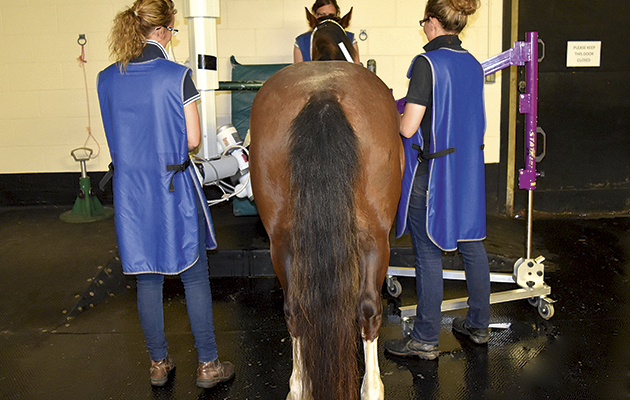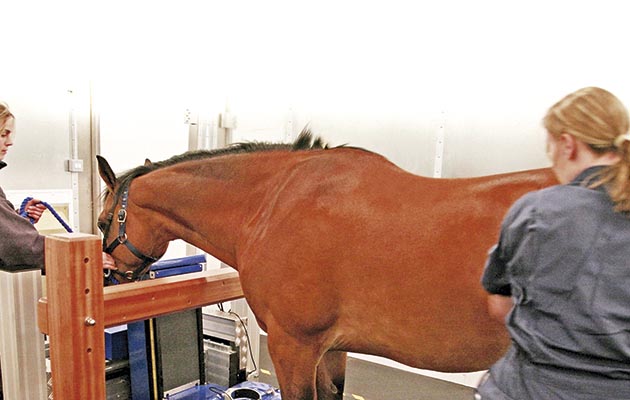How does an equine vet become a specialist — and why might your horse need to see one? Andrea Oakes finds out what you should know if advanced care is called for
It’s an unsettling moment when a vet declares that your horse needs specialist treatment. It looks like things are starting to get serious — or expensive, at least.
You may have more questions than answers at first, but an understanding of the referral system and the various veterinary roles can allay some of the inevitable concerns.
Veterinary medicine works in a similar way to human medicine, in that a standard vet can be likened to a GP and a veterinary specialist to a consultant.
Celia Marr MRCVS, a specialist in equine internal medicine based at Rossdales Equine Hospital, explains: “If your horse is injured or ill, your local practice is normally your first port of call. As with doctors, however, no vet can be an expert in every aspect of veterinary practice. There may be occasions when your horse requires more specialist attention and your vet may recommend referral.”
“The majority of modern equine practices have extensive experience of dealing with commonly encountered problems,” adds Richard Stephenson MRCVS, of Pool House Equine Clinic. “Most offer radiography and ultrasound, and many have good surgical facilities and ability in this area. Some cases may require more advanced techniques or skills than those available in your regular practice, however, and your vet will identify this.”
It’s natural to fear the worst when the word “referral” is used, yet the problem may simply be non-routine rather than significant or severe.
“Most practices often use the services of a network of specialists,” says Richard. “Commonly referred cases include surgical colic, complex lameness and problems requiring advanced imaging techniques such as MRI.
“It’s important to remember that a specialist is not a ‘super-vet’ who is better than your regular vet, but rather someone who has advanced knowledge and skill in a clearly defined field of medicine or surgery.”

What defines a specialist?
The title “specialist” can only be conferred by the Royal College of Veterinary Surgeons (RCVS) and represents the very highest level in clinical veterinary work.
“This status is extremely difficult to achieve,” says Celia. “To be included on its list of specialists, the RCVS states that an individual must have achieved a postgraduate qualification at diploma level (or equivalent), and must additionally make an active contribution to their speciality. Importantly, specialists have to undergo regular reaccreditation to maintain their status.
“They must also be available for referral by other veterinary colleagues and fulfill other criteria such as training veterinary professionals and undertaking research.
“Diploma holders who are available for referrals may apply for inclusion on the list of RCVS specialists,” adds Celia. “Those who have been awarded a diploma from one of the colleges overseen by the European Board of Veterinary Specialists (EBVS) can call themselves a ‘European veterinary specialist’.”
Between the specialist and the primary vet stands a middle tier, the advanced practitioner.
Vets on the RCVS advanced practitioner list must hold a qualification equivalent to a certificate — the first level of postgraduate qualification — and maintain continuing professional development. While they are not specialists, they have demonstrated up-to-date knowledge and competence in their chosen area.

Finding your expert
So how do you go about locating a suitable specialist?
“Depending on your horse’s condition and your personal circumstances, your vet should be able to advise you of the options available to help you make an informed decision,” explains Celia. “Ideally your first-opinion [primary] practice should refer you to a referral centre that employs an RCVS specialist in the relevant field.
“Referral practices can be single-vet, single-discipline concerns, or they may be associated with first-opinion practices. They may also be large, multi-specialist hospitals. In the UK, most veterinary schools also run teaching hospitals with referral clinics.”
Some practices are listed as “secondary referrals only”, while others will undertake initial consultations directly with the public.
“It is perfectly possible to go directly to a specialist, although this is rarely a sensible thing to do,” says Richard. “Selecting the correct specialist is something your own vet is best placed to deal with — and for a successful outcome there needs to be a close rapport between both professionals.
“A word-of-mouth recommendation from a friend, physio or trainer can be helpful, but your own vet will be working regularly with certain specialists and will understand their areas of expertise.”
Perhaps the specialist or advanced practitioner is already based at or associated with your normal practice, or your vet may even arrange for one to visit the premises to operate. More complex treatment or surgery, however, may necessitate travel.
“A multidisciplined centre may have the ability to evaluate and treat the patient as a whole,” says Celia. “This can be especially valuable in cases where several body systems are involved, requiring more than one specialist discipline.
“Once the referral process has been completed, your horse will return to the care of your normal vet.”
Counting the cost
Specialists can be costly — as one would expect, given the years of study they’ve put into obtaining their status. But, as Richard points out, an early and correct diagnosis and treatment plan can be cheaper in the long-term.
“Don’t be afraid to be upfront about any budgetary restrictions you may have,” he says. “It will help if your regular vet knows your spending limit at the beginning of the treatment.
“Modern veterinary medicine is very high-tech and potentially expensive, but most vets will help find an optimal treatment plan — albeit limited to what can be afforded.”
Ref: Horse & Hound; 8 October 2015

